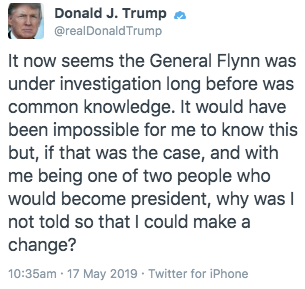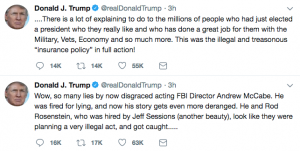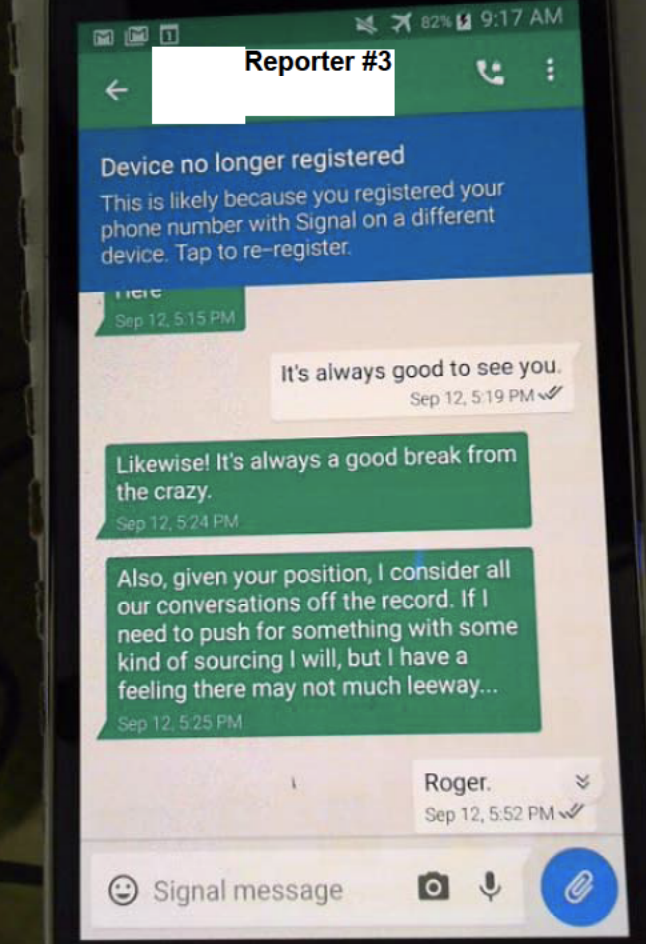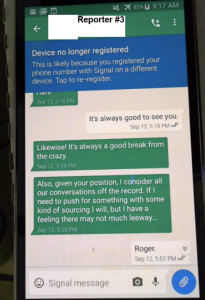There’s a problem with the way the Mueller Report describes events pertaining to Mike Flynn.
It describes how someone under active counterintelligence investigation for his ties to Russia and already on thin ice with the President-Elect got on the phone and, through the Russian Ambassador, persuaded Vladimir Putin to hold off on retaliating for US sanctions. It describes how Flynn avoided leaving a paper trail of that call. Ultimately, the report remains inconclusive about whether Flynn made that call on his own initiative — which would seem to bolster the case he had suspect loyalties with the Russians — or at the direction of the President — in which case his actions would be appropriate from a constitutional standpoint (because this is the kind of thing the President can choose to do), but not a legal one (because he was purposely hiding it from the Obama Administration). One or the other would seem to be a necessary conclusion, but the Mueller Report reaches neither one.
In part, that’s because both Flynn and KT McFarland seem to have protected President Trump’s plausible deniability even after both got caught lying about these events. But it also appears that Mueller is more certain about the answer than he lets on in the public report.
This is the subject that, in my post noting that the Mueller Report has huge gaps precisely where the most acute counterintelligence concerns about Trump’s relationship with Putin are, I suggested created a logical problem for the report as a whole.
If it is the case that Flynn did what he did on Trump’s orders — which seems the only possible conclusion given Mueller’s favorable treatment of Flynn — then it changes the meaning of all of Trump’s actions with regard to the Russian investigation, but also suggests that that conclusion remains a counterintelligence one, not a criminal one.
Mike Flynn was under active counterintelligence investigation but he’s not an Agent of Russia
According to the Mueller Report, the first Rosenstein memo laying out the detailed scope of the investigation, dated August 2, 2017, included “four sets of allegations involving Michael Flynn, the former National Security Advisor to President Trump.” Two of those four must be his unregistered sleazy influence peddling for Turkey (which he got to plead off of as part of his plea agreement) and the Peter Smith operation to obtain Hillary’s deleted emails (about which his testimony is reflected in the Mueller Report).
Then there’s the counterintelligence investigation into Flynn. We’ve known that the FBI had a counterintelligence investigation into Flynn since before HPSCI released its Russian Report, and a later release of that report described that the investigation was still active when the FBI interviewed Flynn on January 24, 2017.
A key focus of that investigation — one reflected in Flynn’s January 24, 2017 302 — was his paid attendance at a December 10, 2015 RT event in Moscow in December 2015, where he sat with Putin. The Mueller Report makes just one reference to that event, and only as a way of describing the public reporting on Trump flunkies’ ties to Russia during the campaign.
Beginning in February 2016 and continuing through the summer, the media reported that several Trump campaign advisors appeared to have ties to Russia. For example, the press reported that campaign advisor Michael Flynn was seated next to Vladimir Putin at an RT gala in Moscow in December 2015 and that Flynn had appeared regularly on RT as an analyst.15
15 See, e.g., Mark Hosenball & Steve Holland, Trump being advised by ex-US. Lieutenant General who favors closer Russia ties, Reuters (Feb. 26, 2016); Tom Hamburger et al., Inside Trump’s financial ties to Russia and his unusual flattery of Vladimir Putin, Washington Post (June 17, 2016). Certain matters pertaining to Flynn are described in Volume I, Section TV.B.7, supra.
However, in addition to that trip, the FBI must have been scrutinizing earlier Kislyak contacts that don’t show up in the Report at all:
- A meeting on December 2, 2015 (described in the HPSCI report) that Kislyak that Flynn and his failson attended in advance of the RT trip at the Russian Embassy
- A call to Kislyak sometime after GRU head Igor Sergun’s death in Lebanon on January 6, 2016; in his interview with the FBI; Flynn said he called to offer condolences, though he used that excuse for other calls that involved substantive policy discussions; he also claimed, not entirely credibly, not to be associated with the Trump campaign yet
- Other conversations during the campaign that Flynn revealed to friends that otherwise don’t show up in public documents
In one of the only (unredacted) references to the counterintelligence investigation into Flynn, the Mueller Report describes that Flynn’s contacts with Kislyak became a key focus of that investigation.
Previously, the FBI had opened an investigation of Flynn based on his relationship with the Russian government.105 Flynn’s contacts with Kislyak became a key component of that investigation.10
But that passage doesn’t reveal the scope of those contacts and, in spite of detailed analysis of other people’s contacts with Kislyak (including an invite to JD Gordan to his residence that appears similar to the December 2015 one Kislyak extended to Flynn and his son), the Report doesn’t mention those earlier contacts.
Perhaps far more interesting, in the report’s analysis of whether any Trump aide was an agent of Russia, it does not include Flynn in the paragraph explaining why Paul Manafort, George Papadopoulos, and Carter Page were not charged as such. Instead, his foreign influence peddling is treated in a separate paragraph discussing just Turkey.
In addition, the investigation produced evidence of FARA violations involving Michael Flynn. Those potential violations, however, concerned a country other than Russia (i.e., Turkey) and were resolved when Flynn admitted to the underlying facts in the Statement of Offense that accompanied his guilty plea to a false-statements charge. Statement of Offense, United States v. Michael T Flynn, No. l:17-cr-232 (D.D.C. Dec. 1, 2017), Doc. 4 (“Flynn Statement of Offense”). 1281
The footnote to that paragraph, which given the admission elsewhere that a separate counterintelligence investigation into Flynn focused on Russia, likely deals with Russia, is entirely redacted for Harm to Ongoing Matters reasons.

While we can’t be sure (hell, we can’t even be totally sure this does relate to Russia!), this seems to suggest that the investigation into Russian efforts to cultivate Flynn is ongoing, but he has been absolved of any responsibility for — as an intelligence officer with 30 years of counterintelligence training — nevertheless falling prey to such efforts.
All of which is to say that, along with the descriptions of Trump’s most alarming interactions with Russians including Vladimir Putin, many of Flynn’s contacts with Kislyak and other Russians (including not just Putin but the guy who headed GRU until just before the election hacking started in earnest in January 2016) appear to be treated as counterintelligence information not suitable for public sharing.
The Mueller Report deliberately obscures key details of the timeline on the sanctions call
That’s important to note, because the counterintelligence conclusion on Flynn has to be utterly central to the analysis of Trump’s attempt to obstruct the investigation into Flynn.
The two discussions in the Mueller Report (Volume I pages 168 to 173 and Volume II pages 24 to 48) of Flynn’s December 2016 conversations with Sergey Kislyak are totally unsatisfying, probably in part because two key witnesses (Flynn and KT McFarland, and possibly others including Steve Bannon) lied when the FBI first interviewed them about the calls; they had also created a deliberately misleading paper trail for the events.
In both places, the Report provides times for some events on December 29, but obscures the most critical part of the timeline. I’ve put the Volume I language at the end of this post. It provides the following timeline for December 29, 2016:
1:53PM: McFarland and other Transition Team members and advisors (including Flynn, via email) discuss sanctions.
2:07PM: [Transition Team Member] Flaherty, an aide to McFarland, texts Flynn a link to a NYT article about the sanctions.
2:29PM: McFarland calls Flynn, but they don’t talk.
Shortly after 2:29PM: McFarland and Bannon discuss sanctions; according to McFarland’s clean-up interview, she may have told Bannon that Flynn would speak to Kislyak that night.
3:14PM: Flynn texts Flaherty and asks “time for a call??,” meaning McFarland. Flaherty responds that McFarland was on the phone with Tom Bossert. Flynn informs Flaherty in writing that he had a call with Kislyak coming up, using the language, “tit for tat,” that McFarland used on emails with others and that Flynn himself would use with Kislyak later that day.
Tit for tat w Russia not good. Russian AMBO reaching out to me today.
Sometime in here but the Report doesn’t tell us precisely when: Flynn talks to Michael Ledeen, KT McFarland, and then Kislyak. [my emphasis]
4:43PM: McFarland emails other transition team members saying that, “Gen [F]lynn is talking to russian ambassador this evening.”
Before 5:45PM: McFarland briefed President-Elect Trump, Steve Bannon, Reince Priebus, Sean Spicer, and others on the sanctions. McFarland remembers that someone at the briefing may have mentioned the upcoming Kislyak call.
After the briefing: McFarland and Flynn speak by phone. Flynn tells McFarland, “that the Russian response to the sanctions was not going to be escalatory because they wanted a good relationship with the incoming Administration,” and McFarland tells Flynn about the briefing with Trump.
The next day, December 30, 2016 — after Putin announced they would not retaliate to Obama’s sanctions — Flynn sent a text message to McFarland that very deliberately did not reflect the true content of his communication with Kislyak, reportedly because he wanted to hide that from the Obama Administration (the Trump team had falsely told Obama they would not fuck with their existing policy initiatives).
Shortly thereafter, Flynn sent a text message to McFarland summarizing his call with Kislyak from the day before, which she emailed to Kushner, Bannon, Priebus, and other Transition Team members. 1265 The text message and email did not include sanctions as one of the topics discussed with Kislyak. 1266 Flynn told the Office that he did not document his discussion of sanctions because it could be perceived as getting in the way of the Obama Administration’s foreign policy.126
On December 31, after Kislyak called again to tell Flynn that Putin had decided not to retaliate because of the Trump Administration request not to, he and McFarland communicated again about their attempts to convince Russia not to respond to sanctions. Flynn spoke with others that day but “does not recall” whether they discussed the sanctions, though he remembers (but Bannon does not) that Bannon seemed to know about Flynn’s conversation with Kislyak.
The narrative for the same events in the obstruction section has less detail, but infuriatingly, similarly manages to leave out all the details (in bold above) about when Flynn spoke to McFarland and when he called Kisylak.
The thing is, Mueller knows precisely when those Flynn calls happened. The Volume I version of events make it clear they have the call records of Flynn, Michael Ledeen, and McFarland that would provide a precise timeline.

They just refuse to provide those times and the times of key emails, which would add to the clarity about whether Trump learned of Flynn’s plans before he contacted Kislyak.
In the “Intent” discussion regarding obstruction, however, the report suggests that the Trump briefing, where sanctions did come up, preceded the first Flynn call to Kislyak (even though the timeline here suggests it did not).
In advance of Flynn’s initial call with Kislyak, the President attended a meeting where the sanctions were discussed and an advisor may have mentioned that Flynn was scheduled to talk to Kislyak.
That’s particularly interesting given that the Volume II discussion of events describes how, after Trump fired Flynn, he also fired KT McFarland but offered her a position as Ambassador to Singapore. There’s very little discussion of the explanation for her firing, but they do describe how Trump tried to make McFarland write a memo — very similar to the false one he tried to make Don McGahn write denying that Trump had ordered him to have Rod Rosenstein removed — denying that he had any role in Flynn’s discussion with Kislyak about sanctions. McFarland did not write the memo, as she explained in a Memo for the Record, because she did not know whether Trump had spoken with Flynn or with Russia directly.
The next day, the President asked Priebus to have McFarland draft an internal email that would confirm that the President did not direct Flynn to call the Russian Ambassador about sanctions.253 Priebus said he told the President he would only direct McFarland to write such a letter if she were comfortable with it.254 Priebus called McFarland into his office to convey the President’s request that she memorialize in writing that the President did not direct Flynn to talk to Kislyak.255 McFarland told Priebus she did not know whether the President had directed Flynn to talk to Kislyak about sanctions, and she declined to say yes or no to the request.256
256 KTMF _00000047 (McFarland 2/26/ 17 Memorandum_ for the Record) (“I said I did not know whether he did or didn’t, but was in Maralago the week between Christmas and New Year’s (while Flynn was on vacation in Carribean) and I was not aware of any Flynn-Trump, or Trump-Russian phone calls”); McFarland 12/22/ 17 302, at 17.
Again, at a minimum, Mueller knows if Trump called Flynn, and may know if Trump called Kislyak or — more likely — Putin. But he’s not telling.
Trump was already pissy with Flynn, so why didn’t he blame him for the sanctions calls?
There’s one more contradictory detail about Trump’s behavior in this narrative.
According to enough witnesses to make it a reliable claim, Trump had already soured on Flynn in December 2016, before all this blew up (but not before Obama warned Trump and Elijah Cummings warned Mike Pence about Flynn’s suspect loyalties).
Several witnesses said that the President was unhappy with Flynn for other reasons at this time. Bannon said that Flynn’s standing with the President was not good by December 2016. Bannon 2/12/18 302, at 12. The President-Elect had concerns because President Obama had warned him about Flynn shortly after the election. Bannon 2/12/18 302, at 4-5; Hicks 12/8/17 302, at 7 (President Obama’s comment sat with President-Elect Trump more than Hicks expected). Priebus said that the President had become unhappy with Flynn even before the story of his calls with Kislyak broke and had become so upset with Flynn that he would not look at him during intelligence briefings. Priebus 1/18/18 302, at 8. Hicks said that the President thought Flynn had bad judgment and was angered by tweets sent by Flynn and his son, and she described Flynn as “being on thin ice” by early February 2017. Hicks 12/8/17 302, at 7, 10
As I’ve noted before, Trump made the same complaint to Jim Comey in their “loyalty demand” dinner on January 27, 2017 — but he did so in the context of Flynn not informing him that Vladimir Putin had beaten Theresa May to congratulating him about his inauguration.
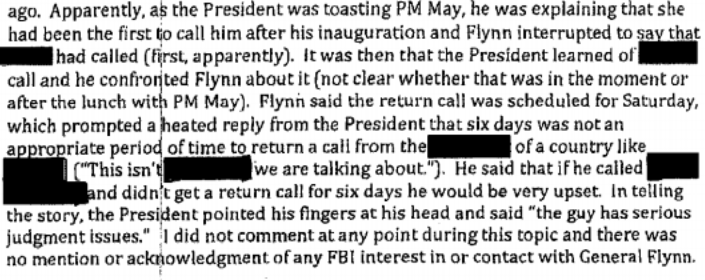
All these details — including that Flynn publicly informed Trump of Putin’s call — should make Flynn a bigger counterintelligence concern, not one that could be dismissed more easily than Page and Manafort and Papadopoulos.
Unless Mueller had more certainty that Trump was in the loop of these sanctions discussions — either through Flynn or directly with Putin — than he lets on in the public report.
Mike Flynn’s Interviews with Prosecutors
To sum up, Mueller knows that someone already under investigation for his suspect calls to Russia and Sergey Kislyak got on the phone with Kislyak and undercut the Obama Administration’s attempt to punish Russia for its election interference. Flynn deliberately created a false record of that call, then lied about it when it became public the following month, and continued to lie about it when the FBI asked him about it.Trump allegedly got pissy that Flynn’s counterintelligence exposure had already been raised by Obama, but also got pissy that Flynn wasn’t being obsequious enough to Putin. But, when this all began to blow up in the press, rather than firing Flynn right away for being a counterintelligence problem — the outcome Sally Yates clearly expected would be the no-brainer result — Trump instead repeatedly tried to protect Flynn.
Which is why the likelihood that a key part of Flynn’s cooperation, that relating to the counterintelligence side of the equation, is so interesting.
As I noted when the addendum showing Flynn’s cooperation came out, it likely broke into the Turkish influence peddling [A], two (or maybe three?) topics relating to Trump [B], as well as more classified part of the investigation conducted under Mueller [C].
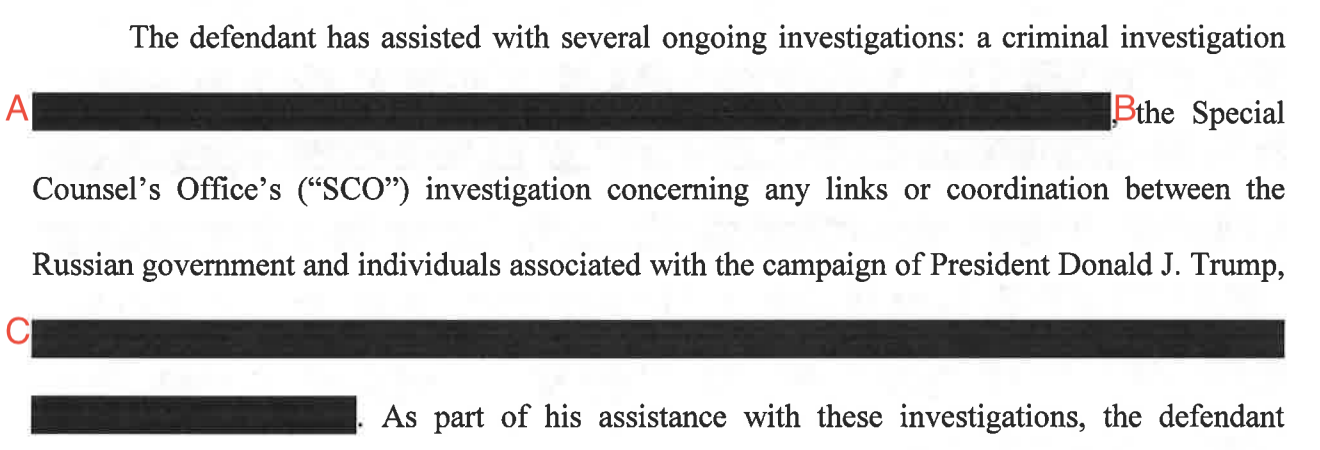
A Criminal Investigation:
11+ line paragraph
6.5 line paragraph
2 line paragraph
B Mueller investigation:
Introductory paragraph (9 lines)
i) Interactions between Transition Team and Russia (12 lines, just one or two sentences redacted)
ii) Topic two
10 line paragraph
9 line paragraph
C Entirely redacted investigation:
4.5 line paragraph
The footnotes from the Mueller Report describing what Flynn told prosecutors when seems to reinforce this.
- November 16, 2017: Trump appoint Flynn as NSA, first call with Putin, Israel vote, communications with Kislyak, December Kislyak call
- November 17, 2017: Israel vote, December Kislyak call, especially comms with Mar a Lago, re Ignatius Flynn said he had not talked sanctions, Mar a Lago with Trump, Flynn’s last meeting with Trump, “we’ll take care of you”
- November 19, 2017: Why sanctions, whether he told others at MAL, comms on 12/29, re Ignatius Flynn said he had not talked sanctions, Mar a Lago with Trump
- November 20, 2017: Whether he told others at MAL, response to Ignatius
- November 21, 2017: Whether he told others at MAL, response to Ignatius, meeting with Trump
- November 29, 2017: Peter Smith
- January 11, 2018: November 30 meeting with Kislyak
- January 19, 2018: Flynn did not have specific recollection about telling POTUS on January 3, 2017
- April 25, 2018: Peter Smith
- May 1, 2018: Peter Smith
- September 26, 2018: Proffer response on meetings with Foresman
We know from court filings that Flynn had 19 interviews with prosecutors, of which four pertain to his sleazy influence peddling with Turkey. Here’s what that seems to suggest about his interviews (assuming, probably incorrectly, that they didn’t cover multiple topics at once):
- Turkish influence peddling: 4 interviews, unknown dates
- Transition events, 7 interviews: 11/16/17, 11/17/17, 11/19/17, 11/20/17, 11/21/17, 1/11/18, 1/19/18
- Peter Smith, 3 interviews: 11/29/17, 4/25/18, 5/1/18
- Counterintelligence: Remaining 5 interviews???, unknown dates
It’s possible, however, there’s a third “links” topic pertaining to Transition era graft, which for scope reasons would not appear in the Mueller Report.
The possibility that Flynn may have had five interviews dedicated to a counterintelligence investigation that implicated Trump would make this Brian Ross story far more interesting. As the Report lays out, when hints that Flynn flipped first came out on November 22, 2017, one of Trump’s lawyers (probably John Dowd) left a voice mail message (!!!) with one of Flynn’s lawyers (probably Rob Kelner). He specifically wanted a heads up about anything that “implicates the President” which would create a “national security issue.”
I understand your situation, but let me see if I can’t state it in starker terms. . . . [I]t wouldn’t surprise me if you’ve gone on to make a deal with … the government. … [I]f . .. there’s information that implicates the President, then we’ve got a national security issue, . . . so, you know, . . . we need some kind of heads up. Um, just for the sake of protecting all our interests ifwe can …. [R]emember what we’ve always said about the ‘ President and his feelings toward Flynn and, that still remains ….
The following day, Trump’s lawyer told Flynn’s that cooperating would reflect hostility to the President.
A week later, once the plea was official on December 1, Flynn had the following leaked to ABC.
During the campaign, Trump asked Flynn to be one of a small group of close advisors charged with improving relations in Russia and other hot spots. The source said Trump phoned Flynn shortly after the election to explicitly ask him to “serve as point person on Russia,” and to reach out personally to Russian officials to develop strategies to jointly combat ISIS.
[snip]
“Flynn is very angry,” the confidant told ABC News Friday. “He will cooperate truthfully on any question they ask him.” [my emphasis]
Only, originally, the story read that Trump asked Flynn to reach out to Russia before the election. The story is often cited as one of the big gaffes of the Russian investigation, but Mother Jones has since corroborated the pre-election timeline with two Flynn associates.
For some reason, Mueller did not hold Mike Flynn responsible for — at a time when he was under active counterintelligence investigation for his ties to Russia — undercutting the official policy of the US on punishing Russia for its election year attack. I wonder whether the content of up to five counterintelligence interviews with Flynn may explain why.
As they are elsewhere, the Washington Post is trying to liberate the filings about Flynn’s cooperation that would explain all this. On Thursday, Emmet Sullivan — the same judge who, after seeing all the sealed filings in Flynn’s case, used some really inflammatory language about Flynn’s loyalty — set a briefing schedule for that effort. Then, acting on his own on Friday, Sullivan scheduled a hearing for June 24 (after the next status report in Flynn’s case but before he would be sentenced) to discuss liberating those filings.
So maybe we’ll find out from the WaPo’s efforts to liberate those documents.
Timeline of known Flynn investigation
November 10, 2016: Obama warns Trump that Mike Flynn’s name kept surfacing in concerns about Russia.
November 18, 2016: Trump names Flynn National Security Adviser.
November 18, 2016: Elijah Cummings warns Mike Pence of Flynn’s Turkish lobbying.
Shortly after inauguration: On “first” call with Kislyak, Flynn responds to Ambassador’s invitation to Russian Embassy that, “You keep telling me that,” alerting others to previous contacts between them.
January 24, 2017: In interview with FBI, Flynn lies about his contacts with Sergey Kislyak.
January 26 and 27, 2017: Sally Yates warns the White House about Flynn’s lies.
February 2, 2017: WHCO lawyer John Eisenberg reviews materials on Flynn’s interview.
February 13, 2017: Flynn fired.
July 19, 2017: Peter Strzok interviewed, in part, about Flynn interview, presumably as part of obstruction investigation.
November 16, 2017: Interview covers: Trump appoint Flynn as NSA, first call with Putin, Israel vote, communications with Kislyak, December Kislyak call.
November 17, 2017: Interview covers: Israel vote, December Kislyak call, especially comms with Mar a Lago, re Ignatius Flynn said he had not talked sanctions, Mar a Lago with Trump, Flynn’s last meeting with Trump, “we’ll take care of you.”
November 19, 2017: Interview covers: Why sanctions, whether he told others at MAL, comms on 12/29, re Ignatius Flynn said he had not talked sanctions, Mar a Lago with Trump.
November 20, 2017: Interview covers: Whether he told others at MAL, response to Ignatius.
November 21, 2017: Interview covers: Whether he told others at MAL, response to Ignatius, meeting with Trump.
November 22, 2017: Flynn withdraws from Joint Defense Agreement; Trump’s lawyer leaves a message for Flynn’s lawyer stating, in part, “if… there’s information that implicates the President, then we’ve got a national security
issue,…so, you know,…we need some kind of heads up.”
November 23, 2017: Flynn’s attorney returns Trump’s attorney’s call, the latter says cooperation would reflect hostility to the President.
November 29, 2017: Interview covers Peter Smith.
December 1, 2017: Flynn pleads guilty, has story leaked to Brian Ross that his cooperation covers Trump’s orders that he take “serve as point person on Russia,” originally stating that the order preceded the election; the story is corrected to say the order comes ” shortly after the election.” Two Flynn associates subsequently told Mother Jones the contacts did start before the election.
January 11, 2018: Interview covers November 30 meeting with Kislyak.
January 19, 2018: Interview covers Flynn did not have specific recollection about telling POTUS on January 3, 2017.
April 25, 2018: Interview covers Peter Smith.
May 1, 2018: Interview covers Peter Smith.
September 17, 2018: Status report asking for sentencing.
September 26, 2018: Flynn’s attorney offers proffer response on meetings with Bob Foresman.
December 18, 2018: After Judge Emmet Sullivan invokes treason and selling out his country, Flynn delays sentencing.
The Volume I Narrative about December 29, 2016
Shortly thereafter, Flynn sent a text message to McFarland summarizing his call with Kislyak from the day before, which she emailed to Kushner, Bannon, Priebus, and other Transition Team members. 1265 The text message and email did not include sanctions as one of the topics discussed with Kislyak. 1266 Flynn told the Office that he did not document his discussion of sanctions because it could be perceived as getting in the way of the Obama Administration’s foreign policy.126
The sanctions were announced publicly on December 29, 2016. 1231 At 1 :53 p.m. that day, McFarland began exchanging emails with multiple Transition Team members and advisors about the impact the sanctions would have on the incoming Administration. 1232 At 2:07 p.m., a Transition Team member texted Flynn a link to a New York Times article about the sanctions. 1233 At 2:29 p.m., McFarland called Flynn, but they did not talk. 1234 Shortly thereafter, McFarland and Bannon discussed the sanctions. 1235 According to McFarland, Bannon remarked that the sanctions would hurt their ability to have good relations with Russia, and that Russian escalation would make things more difficult. 1236 McFarland believed she told Bannon that Flynn was scheduled to talk to Kislyak later that night. 1237 McFarland also believed she may have discussed the sanctions with Priebus, and likewise told him that Flynn was scheduled to talk to Kislyak that night. 1238 At 3: 14 p.m., Flynn texted a Transition Team member who was assisting McFarland, “Time for a call???”1239 The Transition Team member responded that McFarland was on the phone with Tom Bossert, a Transition Team senior official, to which Flynn responded, “Tit for tat w Russia not good. Russian AMBO reaching out to me today.” 1240
Flynn recalled that he chose not to communicate with Kislyak about the sanctions until he had heard from the team at Mar-a-Lago.1241 He first spoke with Michael Ledeen, 1242 a Transition Team member who advised on foreign policy and national security matters, for 20 minutes. 1243 Flynn then spoke with McFarland for almost 20 minutes to discuss what, if anything, to communicate to Kislyak about the sanctions. 1244 On that call, McFarland and Flynn discussed the sanctions, including their potential impact on the incoming Trump Administration’s foreign policy goals. 1245 McFarland and Flynn also discussed that Transition Team members in Mar-a-Lago did not want Russia to escalate the situation. 1246 They both understood that Flynn would relay a message to Kislyak in hopes of making sure the situation would not get out of hand.1247
Immediately after speaking with McFarland, Flynn called and spoke with Kislyak. 1248 Flynn discussed multiple topics with Kislyak, including the sanctions, scheduling a video teleconference between President-Elect Trump and Putin, an upcoming terrorism conference, and Russia’s views about the Middle East. 1249 With respect to the sanctions, Flynn requested that Russia not escalate the situation, not get into a “tit for tat,” and only respond to the sanctions in a reciprocal manner.1250
Multiple Transition Team members were aware that Flynn was speaking with Kislyak that day. In addition to her conversations with Bannon and Reince Priebus, at 4:43 p.m., McFarland sent an email to Transition Team members about the sanctions, informing the group that “Gen [F]lynn is talking to russian ambassador this evening.” 1251 Less than an hour later, McFarland briefed President-Elect Trump. Bannon, Priebus, Sean Spicer, and other Transition Team members were present. 1252 During the briefing, President-Elect Trump asked McFarland if the Russians did “it,” meaning the intrusions intended to influence the presidential election. 1253 McFarland said yes, and President-Elect Trump expressed doubt that it was the Russians.1254 McFarland also discussed potential Russian responses to the sanctions, and said Russia’s response would be an indicator of what the Russians wanted going forward. 1255 President-Elect Trump opined that the sanctions provided him with leverage to use with the Russians. 1256 McFarland recalled that at the end of the meeting, someone may have mentioned to President-Elect Trump that Flynn was speaking to the Russian ambassador that evening. 1257
After the briefing, Flynn and McFarland spoke over the phone. 1258 Flynn reported on the substance of his call with Kislyak, including their discussion of the sanctions. 1259 According to McFarland, Flynn mentioned that the Russian response to the sanctions was not going to be escalatory because they wanted a good relationship with the incoming Administration.1260 McFarland also gave Flynn a summary of her recent briefing with President-Elect Trump. 1261
As I disclosed last July, I provided information to the FBI on issues related to the Mueller investigation, so I’m going to include disclosure statements on Mueller investigation posts from here on out. I will include the disclosure whether or not the stuff I shared with the FBI pertains to the subject of the post.



